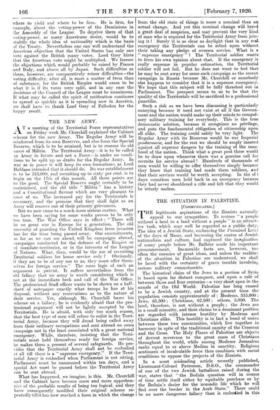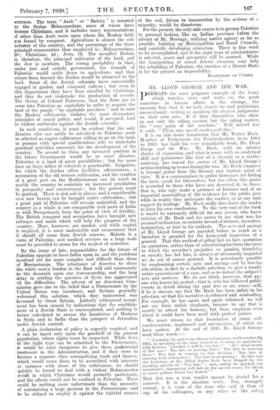THE SITUATION IN PALESTINE.
[COMMUNICATED.]
THE legitimate aspirations of the Zionists naturally appeal to our sympathies. To restore " a people without a land to a land without a people " is an attract- ive task, which may well be regarded as a public duty. The idea of a Jewish State, embracing the Promised Land of the days of Moses, and becoming the centre of Jewish nationalism and culture, had captured the imagination of many people before Mr. Balfour made his important pronouncement. Inexorable facts are, however, too often the enemies of great ideas, and unless the realities of the situation in Palestine are understood, we shall be faced with the certainty of grave trouble involving serious military commitments.
The historical claim of the Jews to a portion of Syria is based upon far distant conquest, and upon a rule of between thiee and four centuries—a very short span in the annals of the Old World. Palestine has long ceased to be a Jewish country, and at the present time the population consists approximately of : Moslems, 515,000 ; Jews, 65,300 ; Christians, 62,500 ; others, 5,050. The land, therefore, is not without a people ; the Jews are in a small minority, and their claims to a dominant position are regarded with intense hostility by Moslems and Christians alike. This hostility is in fact a bond of union between these two communities, which live together in harmony in spite of the traditional enmity of the Crescent and the Cross. The Holy Places of Palestine are objects of devout reverence to the great mass of Christians throughout the world, while among Moslems Jerusalem ranks equal to or above Medina in sanctity. Religious sentiment of incalculable force thus combines with racial conditions to oppose the projects of the Zionists.
In a most misleading article recently published, Lieutenant-Colonel Patterson, D.S.O., the commander of one of the two Jewish battalions raised during the war, states that " the Beduin question will in course of time settle itself either by equitable purchase or by the Beduin's desire for the nomadic life which he will find over the border in the Arab State." There could be no more dangerous fallacy than is embodied in this sentence. The term " Arab " or " Beduin " is resented by the Syrian Mohammedans, some of whom have become Christians, and it includes many representatives of other than Arab races upon whom the Moslem faith was forced by conquest. Agriculture is almost the sole Industry of the country, and the percentage of the three principal communities thus employed is : Mohammedans, 69 ; Christians, 46 ; Jews, 19. The so-called Beduin is, therefore, the principal cultivator of the land, and the Jew is nowhere. The strong probability is that, under just and orderly government, the nomads of Palestine would settle down to agriculture, and that others from beyond the Jordan would be attracted to the land. Some of the Jewish colonists have successfully engaged in garden and vineyard culture ; but even in this department they have been excelled by Christians, and they do not undertake the production of cereals. The theory of Colonel Patterson, that the Jews are to come into Palestine as capitalists in order to acquire the land of the people " by equitable purchase " and to oust the Moslem cultivators, violates the most elementary principles of sound policy, and would, if accepted, lead to violent outbreaks against the Jewish minority.
In such conditions, it must be evident that the only Zionists who can safely be admitted to Palestine must be selected as expert cultivators willing to go on the land, or persons with special qualifications able to undertake practical activities necessary for the development of the country. To accord to them any favoured position in the future Government would be to court disaster. Palestine is a land of great possibilities ; but for some time no large influx of colonists is practicable. Irrigation, for which the Jordan offers facilities, afforestation, a restoration of the old terrace cultivation, and the creation of a good port on the Mediterranean can do much to enable the country to maintain an increased population in prosperity and contentment ; but the process must be gradual. There is rich soil in places, and a considerable area now barren can be brought under cultivation ; but a great part of Palestine will remain unfruitful, and the country as a whole is not comparable with parts of India or with Mesopotamia from the point of view of fertility. The British conquest and occupation have brought new railways and roads which will help the progress of the country. More, however, are needed, and while capital is required, it is most undesirable and unnecessary that it should all come from Jewish sources. Malaria is a curse of Palestine, and medical services on a large scale must be provided to atone for the neglect of centuries.
By the irony of fate, responsibility for the future of Palestine appears to have fallen upon us, and the problems involved are far more complex and difficult than those of Mesopotamia. The reluctance of America to share the white man's burden in the East will add enormously to the demands upon our statesmanship, and the long delay in settling the question of Syria has aggravated all the difficulties. The advent of an American Com- mission gave rise to the belief that a Protectorate by the United States was imminent, and Syrians generally welcomed this solution, which they understood was favoured by Great Britain. Latterly widespread resent- ment has been caused by indications that the establish- ment of a Jewish State is contemplated, and nothing is better calculated to arouse the fanaticism of Moslems in Syria and in India than the prospect of Jerusalem under Jewish control.
A plain declaration of policy is urgently required, and it can be based only upon the goodwill of the present population, whose rights must be respected. While Jews of the right type can be admitted to the Protectorate, it would be most dangerous to give them preferential treatment in the Administration, and if they were to become a separate class monopolizing trade and finance, which would cause them to be accredited with interests at variance with those of the cultivators, we should quickly be forced to deal with a violent Mohammedan revolt in which Christians would probably participate, and the effects would not be confined to Palestine. There could be nothing more unfortunate than the necessity of maintaining a large garrison in the Protectorate ; and to be obliged to employ it against the rightful owners of the soil, driven to insurrection by the actions of a minority, would be disastrous. For the present, the only safe course is to govern Palestine in paternal fashion, like an Indian province before the advent of Mr. Montagu, utilizing native agency as far as possible, building up Municipalities and Rural Councils, and carefully developing education. There is fine work to be accomplished, and if the right type of administrator is selected, peace and prosperity will he assured. While the immigration of sound Jewish elements may help the rebuilding of Palestine, the erection of a Zionist State is for the present an impossibility.
SYDENHAM OF COMBE.







































 Previous page
Previous page